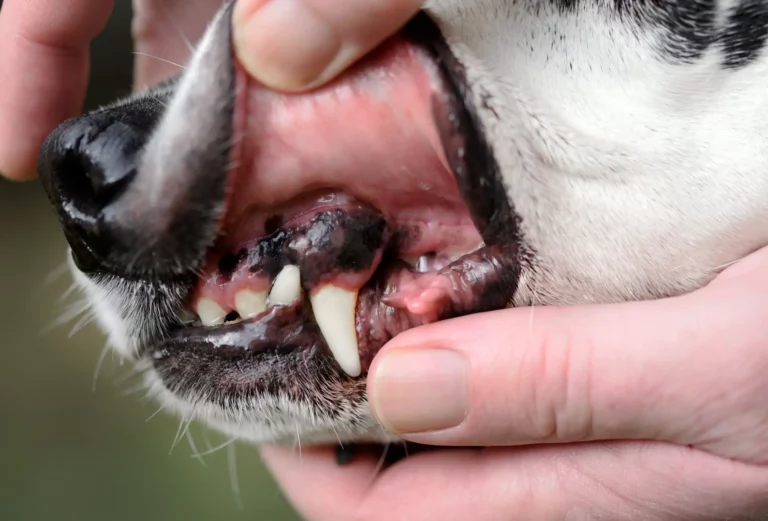Can Dogs Eat Passionfruit? Everything You Need To Know!
Can dogs eat passionfruit? This is a question that many dog owners ask when they want to share their favorite fruits with their furry companions.
As dogs have become more than just pets, becoming integral parts of our families, it’s only natural that we want to share every aspect of our lives with them, including our favorite foods. However, not all foods that are safe for human consumption are suitable for dogs.
In this blog post, we’ll delve into the specifics of whether or not dogs can safely consume passionfruit. It’s always vital to understand your pet’s dietary needs and limitations to ensure their overall well-being.
So, let’s get started!
Key Takeaways & Short Answer:
- Passionfruit pulp is safe for dogs in moderation, but the seeds and rind are not recommended.
- Some dogs might have allergic reactions to passionfruit, so always start with a small amount and monitor your dog.
- Too much passionfruit can lead to digestive issues due to its high fiber content.
- Other fruits, like mango, can be safer and more beneficial for dogs.
- Always consult with your vet before introducing a new food into your dog’s diet.
In short, while dogs can technically eat passionfruit pulp, it should only be offered in moderation and with caution. Always observe your pet after giving them a new food for the first time, and stop feeding it to them if they show any signs of distress or discomfort. Remember, each dog is unique, and what works for one might not work for another.
The Basics: What is Passionfruit?
Passionfruit, scientifically known as Passiflora edulis, is a tropical fruit originating from South America, now widely cultivated in various parts of the world for its sweet, tangy taste and aromatic pulp. The fruit is round or oval, has a tough outer rind, and is filled with a jelly-like pulp with numerous small black seeds.
This fruit is known for its high nutritional value. It is packed with vitamins A and C, dietary fiber, and beneficial plant compounds like antioxidants. Additionally, passionfruit is low in calories and fat, making it a popular choice for health-conscious individuals.
While the human palate enjoys the exotic flavor of passionfruit, it’s crucial to ascertain whether this fruit is equally suitable for our furry friends. The adage “what’s good for humans might not be good for dogs” holds true when it comes to feeding passionfruit to dogs.
Not all fruits and vegetables that humans consume are safe for dogs, hence the importance of researching before sharing your fruity snack with your canine companion.
Nutritional Profile of Passionfruit: What Does it Offer Dogs?
When considering passionfruit for your dog, it’s essential to understand its nutritional profile. Passionfruit is a powerhouse of nutrients that can contribute to the overall well-being of humans, but does it offer the same benefits to dogs?
Each passionfruit contains approximately 17 calories and is rich in dietary fiber, which aids in digestion and helps maintain a healthy weight. Fruit is a good source of vitamins, specifically Vitamin A and Vitamin C.
Vitamin A plays a vital role in maintaining healthy vision, skin, and immune system, while Vitamin C acts as an antioxidant, helping protect the body’s cells from damage.
Additionally, passionfruit is packed with beneficial plant compounds like antioxidants, which can help fight inflammation and bolster the immune system. Other minerals present in passionfruit include iron, magnesium, phosphorus, potassium, and folate.
However, it’s crucial to remember that dogs have different nutritional requirements than humans. While the nutrients in passionfruit can be beneficial, dogs get most of their required nutrients from their primary diet of meat-based dog food.
As a result, it’s best to treat fruits, including passionfruit, as an occasional treat rather than a diet staple for your dog.
Can Dogs Eat Passionfruit: Unraveling the Truth
The short answer to ‘Can dogs eat passionfruit?’ is yes, but with some precautions. Dogs can consume the pulp of passionfruit as it contains various nutrients that can be beneficial to them. However, while the pulp of passionfruit can be eaten, there are specific parts of the fruit that are off-limits for dogs.
Most importantly, dog owners should avoid feeding their dogs passionfruit seeds and rind. The seeds can be a choking hazard, and they contain small amounts of cyanogenic glycosides, which can lead to cyanide poisoning in large amounts.
Even though the seeds’ toxic level is significantly lower than the threshold that could cause harm, it’s best to play it safe and avoid them entirely.
The rind or skin of the passionfruit is tough and can cause digestive issues if ingested by dogs. Consuming the rind could lead to gastrointestinal blockages that might require veterinary intervention.
Therefore, when feeding passionfruit to your dog, ensure that you only offer the pulp. Also, like any other new food, start with a small amount to see how your dog reacts. If your dog has no adverse reactions, you can gradually increase the amount over time.
However, passionfruit should only be given as an occasional treat and not a regular part of your dog’s diet.
It’s also a good idea to consult your veterinarian before adding any new food to your dog’s diet, including passionfruit. They can provide guidance based on your dog’s specific health conditions and dietary needs.
Potential Risks and Hazards of Passionfruit for Dogs
1. The Issue with Passionfruit Seeds
One crucial aspect to consider when feeding your dog passionfruit is the potential hazard posed by its seeds. While the fruit’s pulp can be quite nutritious for dogs, the seeds can pose a choking hazard, especially for smaller breeds.
Additionally, passionfruit seeds contain small amounts of cyanogenic glycosides, compounds that can produce cyanide when broken down. While it is unlikely that your dog could consume enough seeds to result in poisoning, it is a risk that pet owners should be aware of.
Therefore, when offering passionfruit to your dog, it is advisable to remove the seeds first.
2. Ripe vs Unripe Passionfruit: What’s the Difference?
When feeding passionfruit to your dog, it’s essential to ensure that the fruit is ripe. Unripe passionfruit can be quite hard and may be difficult for your dog to chew and digest, potentially leading to gastrointestinal issues.
Moreover, unripe passionfruit might contain higher levels of harmful compounds, like cyanogenic glycosides, increasing the risk of adverse effects. Therefore, it’s best to only offer your dog ripe passionfruit that is soft to touch and has a rich, aromatic smell.
3. Toxicity of Passionfruit Vines
While the pulp of passionfruit can be safe for dogs when consumed in moderation, the same cannot be said for passionfruit vines. The leaves and stems of the passionfruit plant contain higher concentrations of cyanogenic glycosides and can be toxic to dogs if ingested.
If you have a passionfruit vine in your garden, ensure that it’s out of your dog’s reach to prevent accidental ingestion. If you suspect that your dog has eaten any part of a passionfruit vine, it’s important to contact your vet immediately.
Signs of toxicity can include drooling, vomiting, and difficulty breathing.
What to Do if Your Dog Eats Passionfruit: Immediate Steps and Precautions
The reaction you should take if your dog eats passionfruit largely depends on what part of the fruit they’ve consumed and how much they’ve eaten. If your dog has only eaten a small amount of passionfruit pulp without seeds, there’s typically no cause for concern.
Monitor your pet for any unusual behavior or signs of discomfort, but the fruit’s nutrients could actually be beneficial for them.
However, if your dog has consumed a large quantity of passionfruit, especially the seeds or any part of the vine, it’s crucial to act swiftly. Here are the steps you should follow:
- Keep Calm: It’s natural to feel panicked, but staying calm is crucial to handle the situation effectively. Your dog will pick up on your anxiety, which could exacerbate their own stress levels.
- Check for Symptoms: Look for signs of distress or discomfort in your dog. This could include symptoms such as excessive drooling, vomiting, diarrhea, loss of appetite, or difficulty breathing.
- Contact Your Vet: If your dog shows any symptoms of discomfort or if they’ve eaten a significant amount of passionfruit seeds or any part of the vine, contact your vet immediately. Provide them with as much information as you can, including the amount and part of the passionfruit your dog has consumed.
- Follow Your Vet’s Advice: Your vet may provide advice over the phone, ask you to monitor your dog, or request that you bring your dog in for a check-up or treatment. Follow their instructions carefully.
Remember, while passionfruit can be a healthy treat for dogs, it’s always best to introduce any new food slowly and with close observation.
Can Dogs Drink Passionfruit Juice?
In the world of canine nutrition, not all human treats are safe for dogs, and this includes some drinks as well. While passionfruit itself can be a nutritious treat for dogs when served correctly, passionfruit juice is a different story.
Commercially produced passionfruit juice often contains high levels of added sugar, and in some cases, artificial sweeteners, both of which can be harmful to dogs. Excessive sugar can lead to obesity and diabetes in dogs, just like in humans.
Artificial sweeteners, particularly xylitol, are extremely toxic to dogs and can lead to serious health problems such as hypoglycemia and even liver failure.
Additionally, the juice might contain a higher concentration of passionfruit seeds, which we’ve learned can pose a potential risk for your furry friend.
If you’ve made the juice at home with no added sugars or sweeteners, a small amount may not be harmful. However, it’s always best to consult with your veterinarian before introducing new foods or drinks into your dog’s diet.
In conclusion, it’s generally best to avoid giving your dog passionfruit juice. There are many other safer options for keeping your dog hydrated, like plain water or special dog-friendly broths. Always prioritize your dog’s health and opt for drinks and treats specifically designed for canine consumption.
Exploring Other Fruits: Can Dogs Eat Dragon Fruit and Mango?
We’ve explored the concept of dogs and passionfruit, but what about other fruits, like dragon fruit and mango?
Dragon Fruit
Dragon fruit, also known as pitaya, is safe for dogs to eat in moderation. This fruit is low in calories but high in fiber, vitamin C, and antioxidants, which can help boost your dog’s immune system.
The seeds in dragon fruit are small and shouldn’t pose a risk like passionfruit seeds might. However, always introduce new foods gradually to avoid upsetting your dog’s stomach.
Mango
Mango is another fruit that dogs can enjoy. It’s packed with vitamins A, B6, C, and E and also contains fiber and antioxidants. However, there are a few things to be aware of. First, always remove the pit before offering mango to your dog.
The pit is not only a choking hazard but also contains small amounts of cyanide. Secondly, mangoes have high sugar content, so they should be given sparingly to prevent weight gain and other health issues related to excessive sugar consumption.
As a general rule, fruits should not make up a large portion of your dog’s diet. They’re great as an occasional treat, but your dog’s primary diet should still be high-quality dog food balanced for their age, breed, and health status.
Always consult your vet if you’re thinking about making significant changes to your dog’s diet or if you’re unsure about feeding them a certain type of food.
Can Dogs Eat Mango and Passionfruit Yogurt?
Dairy products like yogurt can be a contentious topic in dog nutrition. Some dogs can handle dairy without any issues, while others may experience gastrointestinal upset like diarrhea and vomiting.
If your dog has consumed dairy before without any problems, small amounts of mango and passionfruit yogurt could be an acceptable treat.
However, there are a few important considerations to remember:
Sugar Content
Most flavored yogurts, including those with mango and passionfruit, contain high amounts of sugar. Too much sugar can lead to obesity, dental problems, and even diabetes in dogs.
Artificial Sweeteners
Some yogurts contain artificial sweeteners, which can be harmful to dogs. The sweetener xylitol, in particular, is extremely toxic to dogs and can cause rapid insulin release leading to low blood sugar, seizures, liver failure, and even death.
Lactose
While some dogs can tolerate lactose, many can’t, leading to stomach upset, diarrhea, and gas.
To make a safe choice, opt for plain, unsweetened yogurt, which can be beneficial for dogs due to its probiotic content. You can add small pieces of fresh mango for flavor – but remember to avoid the pit.
As for passionfruit, as we learned earlier, only the pulp is safe, and even that should be given in moderation due to the high sugar content.
Always monitor your dog after introducing any new food into their diet and consult your vet if you notice any adverse reactions.
Can Dogs Eat Dried Passionfruit?
Dried fruits can often be a convenient and tasty treat, but when it comes to feeding them to your dogs, caution is needed. Dried passionfruit, like many dried fruits, concentrates all the sugars present in the fresh fruit.
This high sugar content can pose health risks for dogs, including obesity and diabetes, especially when consumed in large amounts.
Additionally, it’s also crucial to ensure that dried passionfruit hasn’t been treated with any preservatives, additives, or artificial sweeteners which can be harmful to dogs. Particularly, sulphur dioxide, often used in dried fruits to maintain color and prolong shelf life, can cause allergic reactions or toxicity in dogs.
As with any new food item, if you do choose to feed your dog dried passionfruit, it should be given in small amounts as a rare treat, not a dietary staple. Always observe your dog closely for any signs of distress or discomfort, and when in doubt, consult with your veterinarian.
Remember, the fresh pulp of passionfruit is generally safer and more beneficial for dogs due to its lower sugar content and lack of additives. As with any fruit, moderation is key to ensuring the health and safety of your canine companion.
Understanding Dogs’ Fruit Consumption: What Fruits Can Dogs Eat?
A balanced diet for dogs doesn’t only revolve around meat. Certain fruits can provide your furry friend with essential nutrients and dietary fiber, contributing to their overall health and well-being.
Here’s a list of fruits that are generally safe for dogs to consume:
- Apples: Apples are a great source of vitamins A and C, as well as fiber. Make sure to remove the seeds and core before giving an apple to your dog, as they contain cyanide which is harmful to dogs.
- Bananas: Rich in potassium and vitamins, bananas are safe for dogs but should be given in moderation due to their high sugar content.
- Blueberries: These berries are a superfood packed with antioxidants, beneficial for dogs in small quantities.
- Oranges: Oranges are safe for dogs to eat, providing vitamin C, potassium, and fiber. However, they are high in sugar, so they should only be given as an occasional treat.
- Pears: Pears are a good source of vitamins and fiber. Just like apples, make sure to remove the seeds and core before giving a pear to your dog.
- Pineapple: This tropical fruit is full of vitamins, minerals, and fiber. It also contains bromelain, an enzyme that makes it easier for dogs to absorb proteins.
While these fruits are generally safe for dogs, individual reactions may vary. Always introduce any new food into your dog’s diet gradually and under close observation.
And remember, all fruits should be given in moderation and should not make up a significant portion of your dog’s diet. If your dog has any pre-existing health conditions, or if you have any concerns, it’s best to consult with your vet before introducing new foods.
The Role of Passionfruit in a Dog’s Diet
While the mainstay of your dog’s diet should be high-quality, nutritionally balanced dog food, adding a small amount of passionfruit occasionally can bring a delightful change of pace. Passionfruit offers a unique combination of flavor and nutrients that can benefit your canine companion.
Vitamin C in passionfruit can support your dog’s immune system, while dietary fiber can help improve their digestion. Moreover, passionfruit is a low-calorie treat, making it a healthier alternative to many commercially available dog treats.
However, passionfruit should never make up a significant portion of your dog’s diet. Think of it as a treat or supplement rather than a meal. Remember, all fruits should be introduced gradually to monitor for any allergic reactions or digestive issues.
Most importantly, when giving your dog passionfruit, make sure it’s thoroughly washed, the hard outer rind is removed, and the seeds are taken out, as they may pose a choking hazard or cause an intestinal blockage.
Do keep in mind that while some dogs might enjoy the unique taste of passionfruit, others may not show the same enthusiasm. That’s completely fine. Dogs, just like people, have their own individual taste preferences.
Lastly, always consult your vet before adding any new food to your dog’s diet. Every dog is unique, and what works for one may not necessarily be the best for another. Your vet knows your dog’s health the best and can provide guidance tailored specifically to your dog’s needs.
Alternatives to Passionfruit in a Dog’s Diet
If your dog does not take to passionfruit or if it’s not readily available in your area, there are plenty of other fruits that can be safely included in your dog’s diet. Each of these fruits brings its own set of nutritional benefits. As always, remember to introduce any new food gradually and in moderation.
1. Apples: Apples are a fantastic source of vitamins A and C, as well as dietary fiber. Make sure to remove the core and seeds before offering an apple to your dog.
2. Bananas: This potassium-rich fruit is an excellent treat for dogs. However, due to the high sugar content, it should be given sparingly.
3. Blueberries: Often referred to as a superfood, blueberries are packed with antioxidants. They’re also small and soft, making them a safe and healthy treat.
4. Oranges: Oranges are rich in vitamin C, but like bananas, they are high in sugar. Offering a few segments occasionally is typically safe.
5. Pears: Pears provide good amounts of vitamins A and C and are a nice treat when served in moderation. Always remove the pit and seeds first.
6. Watermelon: Hydrating and packed with vitamins A, B6, and C, watermelon can be a great summertime treat. Always remove the rind and seeds before serving.
While the list above includes generally safe fruits for dogs, there are others that should be strictly avoided due to their toxicity, such as grapes and avocados. If in doubt, always check with your veterinarian before introducing any new food into your dog’s diet.
Understanding Food Allergies in Dogs: Could Passionfruit be a Culprit?
Food allergies in dogs are not uncommon, and they can manifest in a variety of ways, including skin irritation, digestive issues, and respiratory distress. But can passionfruit be a potential allergen for your furry friend?
The short answer is yes. While passionfruit allergies are not common in dogs, they can still occur. Similar to humans, dogs can develop an allergic reaction to any food item, and passionfruit is no exception.
If your dog has not been exposed to passionfruit before, it’s crucial to observe their reaction closely after they consume it for the first time.
Symptoms of a food allergy in dogs can range from mild to severe and may include:
1. Skin irritation: Look for signs of itchiness, redness, and inflammation on your dog’s skin, especially around the ears and paws.
2. Digestive issues: Diarrhea, vomiting, and excessive gas can be signs that your dog is allergic to something they have eaten.
3. Respiratory distress: Although less common, some dogs may exhibit respiratory symptoms such as coughing, wheezing, or difficulty breathing.
4. Anaphylaxis: In rare cases, a severe allergic reaction could lead to anaphylaxis, a life-threatening condition that requires immediate veterinary attention.
If your dog shows any signs of an allergic reaction after consuming passionfruit, contact your vet immediately. They can conduct an allergy test to determine if passionfruit is indeed the culprit, and guide you on how to manage your dog’s diet moving forward.
When to Consult a Vet: Passionfruit Ingestion Concerns
Determining what is safe for your dog to eat can sometimes be a complex task, especially with a wide variety of foods available. Passionfruit, while generally not harmful, can pose some risks that might warrant a visit to the vet.
1. Excessive consumption: If your dog has consumed a large amount of passionfruit, it’s best to consult with a vet. Overeating any food can cause digestive upset, but the high fiber content in passionfruit may lead to diarrhea in dogs.
2. Signs of distress: Should your dog show any signs of distress like vomiting, diarrhea, excessive drooling, or changes in behavior after eating passionfruit, it’s crucial to seek immediate veterinary care. These could be indications of an adverse reaction or even a possible allergy.
3. Ingestion of the vine or leaves: Passionfruit vines and leaves can be toxic to dogs. If you suspect your dog has ingested any part of the plant other than the fruit itself, contact your vet immediately.
4. Chronic health conditions: Dogs with chronic health conditions such as diabetes should have their diet closely monitored. If your dog has any existing health condition, consult with your vet before adding any new food to their diet, including passionfruit.
Remember, your vet is the best resource when it comes to your dog’s health and diet. Always keep them in the loop about any changes in your dog’s diet or behavior. A healthy dog is a happy dog!
Final Thoughts
In conclusion, the question, “can dogs eat passionfruit?” is not a simple yes or no answer. While the pulp of ripe passionfruit can be safe for dogs in moderation, certain parts of the fruit and plant, such as the seeds, unripe fruit, and vines, can pose potential risks.
Therefore, if you decide to introduce passionfruit into your dog’s diet, it should be done carefully and sparingly.
Even though passionfruit contains some nutrients beneficial for dogs, remember that it should never replace a balanced, dog-friendly diet. When it comes to feeding your dog anything new, it’s always a good idea to consult with your vet first to ensure it is safe and healthy for your particular pet.
After all, every dog is unique and may react differently to certain foods.
Moreover, if your dog has eaten any part of the passionfruit or the plant and exhibits signs of distress, contacting a vet should be your immediate course of action. Your dog’s health and well-being are paramount, so always be cautious when introducing new foods, like passionfruit.
Remember, the love and care we invest in our furry friends, including their diet, reflect directly on their health and happiness. Happy pet parenting!
References
- Can Dogs Eat Passionfruit? – MasterClass.com
- Can Dogs Eat Passion Fruit? – BoneAppeTreat.com
- Dog Eating Ripe Passion Fruit Fallen – JustAnswer.com
- Can Dogs Eat Passion Fruit: Is It Safe? – DogTime.com







